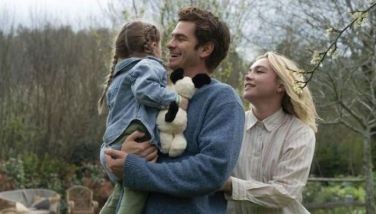Victor Frankenstein: A monstrous miscalculation
CEBU, Philippines – Whether you call it a hybrid, an origin story, a prequel, spinoff or “regeneration,” the stitched-together monster mashup that is “Victor Frankenstein” is in one sense a perfect specimen: It exemplifies the more-is-less school of moviemaking. Retelling Mary Shelley’s horror classic from the viewpoint of Igor, the title character’s right-hand man, the film abounds in organs, limbs, entrails and bodily fluids, both human and non. Yet it never gets beneath the skin.
Whether they’re fans of the lead actors, the genre or the source novel, audiences for the long-delayed release will find all sorts of excess on display, but thrills in short supply. Director Paul McGuigan juggles action sequences, broody Gothic imagery and jokey meta-jabs in a vain attempt to raise the story from the dead. Stars James McAvoy and Daniel Radcliffe, though game, struggle to breathe life into the proceedings, their characters trapped in a no-man’s-land between Grand Guignol and camp.
The feature’s surfeit begins with an overload of introductory voiceover. Max Landis spells out everything that’s spellable in his screenplay, whether that calls for Radcliffe’s narrating Igor to invoke Shelley’s themes (“A mad genius. An unholy creation”) or the actors to enunciate them within the action. McAvoy’s Victor, all self-confident swagger (with the requisite wounded heart), and Radcliffe’s recovering victim Igor, an innocent drawn as much from Mel Brooks as from Mary Shelley, are the yin-yang duo at the story’s center. They meet at the circus, where production designer Eve Stewart, costume designer Jany Temime and cinematographer Fabian Wagner conjure a bright storybook look that contrasts strikingly with the surrounding city’s industrialized grit.
A hunchbacked clown in Pagliacci makeup, Igor is also the troupe’s self-taught doctor, but that doesn’t stop him from being abused onstage and off. “It’s hard to judge cruelty when you’ve never known kindness,” he tells the audience in the only memorable voiceover line. Victor’s instant recognition of the slightly younger man’s medical know-how is a strong starting point for Landis’ reimagining of the saga, although that kernel of mutual respect gets lost amid the numbing sensory onslaught.
Victor busts Igor out of his showbiz prison, an escape that unfolds in a choppy mix of slo-mo, knife-fight maneuvers and conflagration, the first worrying sign that the movie is trying hard to be too many things. Back at Victor’s cavernous home/laboratory, in a scene that’s unforgettable for its sheer grossness, Victor relieves Igor of his misidentified spinal deformity by draining what turns out to be a massive abscess on his back.
Cleaned up and humanized, Igor is enlisted by Victor as a full-fledged partner in a secret project to reanimate the dead. Sulfates, metals and electrodes figure in the experiment, not to mention eyes suspended in gelatinous goo. At a Royal College of Medicine presentation of his first hodgepodge Prometheus, a homunculus built from multiple species — to McGuigan’s credit, the effect is practical, not digital — Victor attracts a crucial investor (Freddie Fox), who has a conveniently storm-swept Scottish castle to offer for the project’s final chapter. At the same time, Victor’s avid traffic in animal parts has attracted the attention of a dour Scotland Yard inspector (Andrew Scott), a man of joyless faith who’s just as obsessed as his quarry.
McAvoy and Radcliffe are actors with charm to burn, but it’s only in brief moments that their characterizations cut through the film’s pandemonium, while the jokes they’re called upon to deliver land with a thud. McAvoy is appropriately brash and obsessed as Victor, who’s given to rants about in-vitro fertilization that place him many dozens of decades ahead of his time, indifferent to the squirmy reactions of his posh dinner companions. Igor is a simpler reduction, little more than mounting reluctance to help his mentor defy natural law. By the time Charles Dance shows up in the stock role of Victor’s disapproving father, the renegade medical student has already used the phrase “in our own image” to describe his life’s work — setting off an uh-oh lightbulb for Igor, who nonetheless joins Victor in a whiskey-fueled brainstorming session for the giant creature’s design.
Timeless and of-the-moment, the questions of immortality, hubris and the limits of science and technology play out here with emphatic overstatement, provoking not an instant of the deep shudder that animates Shelley’s story. Intended emotional undercurrents are similarly dead on arrival, whether it’s the boilerplate backstory that motivates Victor or Igor’s love for trapeze artist Lorelei (Jessica Brown Findlay). In a movie where every character is one-note, Lorelei’s distinction is that she embodies none.
McGuigan has concocted some handsome evocations of Victorian London. Exteriors of a cliff-top castle in Scotland heighten the mood of the climactic sequence, as does the visceral sound design. And the well-proportioned music soundtrack, with excerpts from Strauss, Schubert and Delibes and a score that incorporates choral elements, is restrained in comparison to the visuals.
But amid the state-of-the-art lightning and thunder and the impressively designed cranks and pulleys, it’s hard not to long for the stark black-and-white simplicity of James Whale’s 1931 “Frankenstein.” The only real horror in this frenetic spectacle is how unaffecting it is. (hollywoodreporter.com)
- Latest























